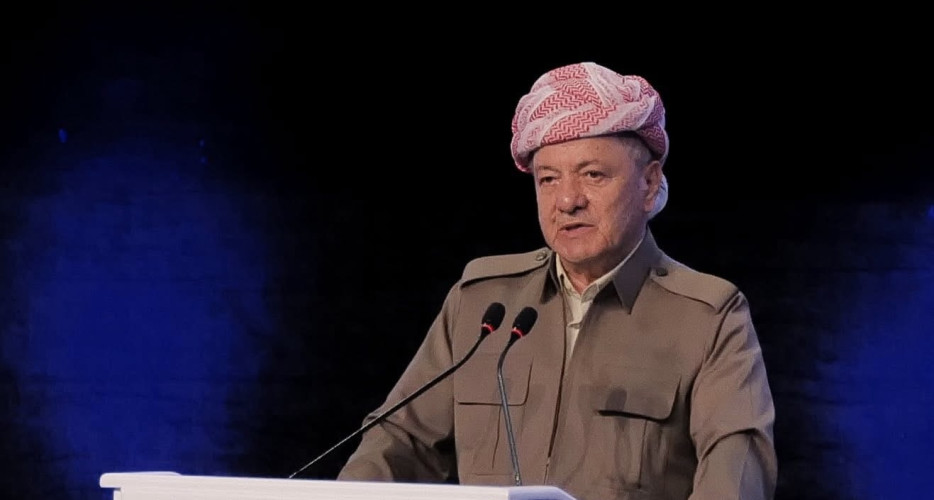Kurdish Fury Over Salary Freeze, Massoud Barzani: Salary cuts equal to Anfal, genocide

Peregraf
As the people of the Kurdistan Region mark Eid al-Adha amid a worsening financial crisis, Kurdistan Democratic Party (KDP) President Massoud Barzani issued a powerful and emotional statement, equating the ongoing salary cuts and economic pressure from Baghdad with the darkest chapters of Kurdish history, including the Anfal campaign and chemical attacks committed by the former Iraqi regime.
In a strongly worded message released on the eve of the holiday, Barzani accused the federal government of using financial pressure as a political weapon against the people of Kurdistan. He described the ongoing delays and cuts in salaries for public sector employees as a “policy of mass starvation” and drew direct comparisons to the crimes of genocide once inflicted on the Kurdish people.
“We are heading towards the holy holiday when the salaries of the people of the Kurdistan Region have been cut by the authorities in Baghdad,” Barzani said. “The salary cuts and the policy of mass starvation of the Kurdish people are no different from the Anfal, chemical attacks, and the genocide committed by the previous regime against the Kurdish people.”
Barzani’s comparison to Anfal — the campaign of mass killings, destruction of villages, and chemical attacks carried out by Saddam Hussein’s regime in the late 1980s — is among the most severe rhetoric yet used by Kurdish leaders in reaction to the current economic standoff with Baghdad.
The KDP leader emphasized that despite ongoing oppression and attempts to weaken the Kurdistan Region through financial pressure, the Kurdish people’s will and resilience remain unbreakable.
“But the will of the Kurdish people is stronger than any oppression, crime or Anfal. Let those who oppose the people and the Kurdistan Region look back at history. The Kurdish people resisted all pressures and violence and defeated the opponents and criminals, and the oppressors remained regretful.”
His message comes at a time when thousands of Kurdish families are preparing for Eid without receiving their wages — a situation that has led to widespread discontent, economic hardship, and protests in parts of the region. Many public servants have gone months without full or regular salaries due to disputes between the Kurdistan Regional Government (KRG) and the federal government over budget transfers, oil revenue, and administrative control.
Barzani also used the occasion to honor the endurance and dignity of the Kurdish people, thanking them for their continued resistance.
“On this holy occasion, while thanking the resistance, courage and pride of our people, I ask God to bring good and prosperity to Kurdistan and Iraq, peace and stability to our region and the whole world.”
Widespread Concern Among Leaders
Barzani’s remarks were echoed by other Kurdish leaders, though in less confrontational tones. Bafel Jalal Talabani, President of the Patriotic Union of Kurdistan (PUK), also addressed the issue of unpaid salaries in his Eid message, calling it a betrayal of the Kurdish public servants.
“I am concerned that the salaried employees are celebrating this holiday without receiving their salaries. It is a great betrayal that the salaried employees of the Kurdistan Region are deprived of this basic right,” Talabani said. “Rest assured that after the holidays we will intensify our efforts to remove all obstacles and find a way out of this huge problem.”
Kurdistan Regional Government Prime Minister Masrour Barzani also expressed frustration over the financial hardship faced by the people, describing the situation as one of collective punishment.
“It is regrettable and deeply worrying that we are celebrating this holiday in a difficult financial situation due to the mass punishment of Kurdistan Regional Government citizens by the federal government,” Masrour Barzani said. “However, we assure you that the Kurdistan Regional Government will make every effort to overcome this situation and remove this unjust oppression against the salaried employees of the Kurdistan Region.”
Deepening Political Crisis
The war of words between Erbil and Baghdad has intensified in recent months, as the KRG accuses the federal government of withholding funds owed under the Iraqi budget law. Baghdad, in turn, claims the KRG has failed to meet its obligations regarding oil exports and transparency.
The salary crisis has become the most visible and emotionally charged symbol of the broader political rift. As the Eid holiday arrives, the bitterness of financial insecurity weighs heavily on Kurdish families who, year after year, have endured economic uncertainty amidst political disputes.
The crisis escalated after the Iraqi Ministry of Finance announced on May 28 that the KRG had exceeded its 12.67% share of the federal budget and must now fully adopt the federal "Tawtin" electronic payroll system for any further transfers. Kurdish leaders argue that the requirement is politically motivated and undermines regional autonomy.
At an emergency summit on May 31, 43 Kurdish parties condemned the salary cuts as political pressure, warning of regional instability.
New KRG oil contracts with U.S. firms have sparked backlash from Shiite factions. Militia leader Qais al-Khazali accused the KRG of separatist ambitions and illegal exports.